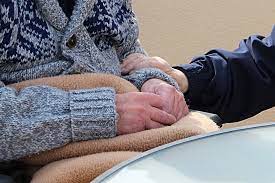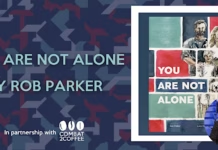- Hope after a stroke: Over a quarter of stroke survivors lost their job after their stroke with some even losing their home or partner – but having ‘hope’ is critical to recovery
- 26% of stroke survivors in Wales say having a stroke cost them their job, over one in ten say it impacted their relationship and some even lost their home
- Across the UK, over half of younger stroke survivors under the age of 50 say they have never emotionally recovered from their stoke
- But nearly one in five felt first signs of hope after a month since having a stroke – although nearly a quarter have not felt any hope in over a year since it happened
- The Stroke Association calls for those who can to donate to give more survivors hope after a stroke
The practical, emotional and physical impact of having a stroke has been laid bare by a new survey of over 3,500 stroke survivors across the UK with 198 respondents from Wales. The research, released today, was conducted by the Stroke Association ahead of World Stroke Day (29 October), is part of a renewed call for vital funds to help the charity give more survivors hope after their stroke and help them to rebuild their lives.
The impact on survivors in Wales
The research reveals that 26% of those in Wales who survived a stroke say it directly led to them losing their job whilst 2% say it led to them losing their home.
Furthermore, over one in ten (14%) say it had a negative impact on their relationship with their partner, with 6% saying it led to their relationship ending. It is not only relationships with partners that are affected – a fifth (20%) say they lost friends as a result of having a stroke.
Younger survivors more severely impacted
Looking at stroke survivors across the UK, the research reveals that the emotional impact of a stroke can impact younger survivors more severely. Amongst those under the age of 50, six in ten (60%) say that they’ve never emotionally recovered from the impact of their stroke. This compares to 44% for those over the age of 50.
This is despite a similar number of younger stroke survivors under the age of 50 (52%) and over the age of 50 (50%) saying they have not physically recovered from their stroke.
The importance of hope
The research shows the importance and transformative power of feeling hope after having a stroke. Over eight in ten of those surveyed in the Wales (82%) say that hope played an important or critical part in their recovery.
But for many, it was not a quick process. Whilst nearly one in five (19%) say they began to feel hope after a month since their stroke, for a quarter (25%) it took more than a year to experience what they felt was the first sign of hope. Meanwhile 12% say they have never felt hopeful since they had their stroke – demonstrating how strokes can impact survivors differently.
The Stroke Association helps people to find the hope they need to rebuild their lives through specialist services, including a Helpline, peer support service, support groups and Support Coordinators.
Alan Thompson, 74, from Pontyclun had a stroke three years ago. He lost all movement down one side and his speech was badly affected. The fatigue that came as a result of his stroke was like no other fatigue.
He said: “When I came round in Intensive Care, I wasn’t with it at all. I didn’t know what was going on. I just remember the doctors telling me I’d had a stroke. On hearing this, I felt like my hospital bed was the deepest darkest hole I’d ever been in. I now know different but the image I had then was of a life of total disability and not being able to do anything ever again.
“I was told by the medical team that I could and would make a recovery. This was my first moment of hope after my stroke. They asked me what was the one thing I really wanted to do again. All I could imagine was being able to get back to playing bowls.
“I drew great comfort and strength from the physiotherapy I received as not only did it improve my physical condition but it also helped me emotionally too. I have gone from being in a wheelchair, to using a Zimmer and now all I need is a walking stick. I’ve gone back to driving and am playing bowls again. There is hope after a stroke. My life has been rebuilt again. I have my independence, I can spend quality time with my family and thanks to the Stroke Association’s Community Steps programme, I am back to playing bowls, my passion.”
Big and small moments of hope
The research found that it can be both big and small moments of hope that are important. When asked what gave them their first moment of hope after a stroke, 15% said it was being able to use their affected side for the first time and 9% said it was being able to speak again. However, 15% said it was being able to complete a small every day task such as making a cup of tea.
Reevaluating what is important after a stroke
The impact of a stroke leads many to reevaluate what is important in life. Over half (52%) say having a stroke made them appreciate their life more, 46% say it made them appreciate their family more and 46% say it made them appreciate the importance of looking after their health.
Katie Chappelle, Associate Director Wales at the Stroke Association said: “Every five minutes, someone in the UK will have a stroke and in a flash, their life is changed. There are more than 70,000 stroke survivors living in Wales and two thirds of people who survive a stroke find themselves living with a disability. The physical impact of a stroke is severe, but for many, the emotional aspects of coming to terms with having a stroke are just as significant. As the research makes clear, finding hope is a crucial part of the recovery process. Without it, recovery can seem impossible.
“At the Stroke Association, we support and help people to find this hope, and rebuild their lives. But with 1.3m people and rising in the UK now living with the effects of a stroke, our services have never been more stretched. We urgently require the support of the public to help us continue to support stroke survivors to rebuild their lives.”
The Stroke Association is asking those who can to donate today so that it can reach more stroke survivors and give them the specialist support they need to find hope and move forward with their recovery. Visit stroke.org.uk/hopeafterstroke

| [donate]
| Help keep news FREE for our readersSupporting your local community newspaper/online news outlet is crucial now more than ever. If you believe in independent journalism,then consider making a valuable contribution by making a one-time or monthly donation. We operate in rural areas where providing unbiased news can be challenging. |



















